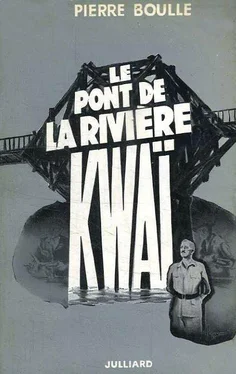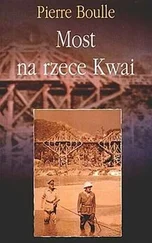“Who set out that line of pegs,” the Colonel asked, coming to a standstill.
“He did, sir,” said the British corporal, springing to attention and pointing to the engineer. “He set it out, but I helped him a little myself. I made a slight improvement as soon as he left. He and I don’t always see eye to eye, sir.”
And, since the sentry was not looking, he gave a conspiratorial v. ink. Colonel Nicholson did not acknowledge this secret message, but remained deep in thought.
“I see,” he said in a voice as cold as ice.
He moved on without further comment and stopped in front of another corporal. This one, with the help of a few men, was devoting considerable effort to clearing the ground of a number of large roots by heaving them up to the top of a slope instead of pitching them down the side of the bank, while another Japanese guard blankly looked on.
“How many are at work in this squad today?” the Colonel asked in ringing tones.
The guard gaped at him, wondering if it was in order for the Colonel to speak like this to the prisoners; but his voice held such a note of authority that he did not dare move. The corporal at once sprang to attention and began to stammer a reply.
“Twenty or twenty-five, sir, I’m not quite sure. One man went sick as soon as we arrived. He suddenly felt dizzy—I can’t think why, sir, for he was perfectly all right at reveille. Three or four of the lads were needed, of course, to carry him to the hospital, sir, as he couldn’t walk by himself. They haven’t come back yet. He was the biggest and the toughest chap in the squad, sir. As it is, we shan’t be able to get through our quota today. There seems to be a curse on this railway.”
“A corporal,” said the Colonel, “ought to know exactly how many men he has under him. What is the quota, anyway?”
“A cubic yard of earth per man per day, sir, to be dug and then carted away. But with these damn roots and all, sir, it look as if it’s going to be too much for us.”
“I see,” said the Colonel as coldly as ever.
He moved off, muttering under his breath through clenched teeth. Hughes and Reeves followed behind him.
They went to the top of a rise, from which they could see the river and the whole of the surrounding country. At that point the Kwai was over a hundred yards wide, with both banks high above the level of the water. The Colonel studied the ground from every angle, then turned to his two subordinates. What he had to say was obvious, but he said it in a voice which had recovered all its former tone of authority.
“These people, the Japanese, have only just emerged from a state of barbarism, and prematurely at that. They’ve tried to copy our methods, but they don’t understand them. Take away their model, and they’re lost. They can’t even do the job they’ve taken on here in this valley, yet it doesn’t need much intelligence. They don’t realize they’d save time by planning an advance instead of rushing bald-headed at the thing. What do you think, Reeves? Railways and bridges are in your line, aren’t they?”
“You’re quite right, sir,” said the Captain, instinctively warming to his subject. “I’ve tackled at least a dozen jobs like this in India. With the material available in the jungle and the personnel that we’ve got here, a qualified engineer could build this bridge in under six months. There are times, I’m afraid, when their incompetence simply makes my blood boil.”
“I agree,” said Hughes. “I can’t help it, but I sometimes feel like screaming at the sight of such inefficiency. You’d think it was quite simple to ”
“What about me?” the Colonel broke in. “Do you think I’m pleased with this scandalous state of affairs? I’m absolutely appalled by what I’ve seen this morning.”
“Well, anyway, sir,” laughed Captain Reeves, “I don’t think we need worry about the invasion of India if this is the line they say they’re going to use. The bridge across the Kwai is not quite ready to take the weight of their trains!”
Colonel Nicholson was deep in thought, but he kept his blue eyes firmly fixed on his two companions.
“Gentlemen,” he said, “I can see we’ll have to take a very firm line if we want to regain control of the men. Through these savages they’ve fallen into idle, slipshod habits unbecoming to members of His Majesty’s forces. We’ll have to be patient with them and handle them carefully, for they can’t be held directly responsible for the present state of affairs. What they need is discipline, and they haven’t had it. It’s no good using violence instead. You only have to look at the result—a lot of disconnected activity, but not a single positive achievement.
These Orientals have shown how incompetent they are, when it comes to man management.”
There was a moment’s silence while the two officers wondered what he really meant by these remarks. But they were quite clear; there was nothing to read between the lines. The Colonel had spoken in his usual forthright manner. He let his words sink in and then went on:
“I must ask you, therefore—and I’ll ask all the other officers as well—to show as much consideration as possible at first. But on no account must our patience be stretched to the point of weakness, or else well fall to the level of these brutes. I shall also speak to the men myself. As of today, we’ve got to put a stop to this disgraceful inefficiency. We can’t have the men going absent on the slightest provocation. The N.C.O.s must answer any question put to them promptly and clearly. I don’t think I need remind you of the need for firm action at the first sign of sabotage or malingering. A railway line is meant to run horizontally, and not twist about like a switchback, as you so rightly observed, Reeves…
In Calcutta, Colonel Green, commanding Force 316 , was studying a report which had just come in by the usual roundabout route, a report embellished with the marginal comments of half a dozen military and paramilitary clandestine services. Force 316 (better known as “The Plastic and Destructions Co., Ltd.”) had not yet reached the important position that it later held in the Far East, but it was already taking an active, passionate, and exclusive interest in Japanese war establishment in the occupied countries of Malaya, Burma, Siam, and China. What it lacked in material resources, it tried to make up for by the boldness and dash of its agents.
“Well, it’s the first time I’ve ever known them all to agree,” Colonel Green muttered. “We ought to do something about it.”
The first part of his remark referred to the various clandestine services associated with Force 316, each working in a separate watertight compartment and pursuing an individual policy of its own, with the result that they often came to widely different conclusions. This used to infuriate Colonel Green, who was responsible for planning operations from all the intelligence available. “Ops” was the preserve of Force 316; Colonel Green was not interested in theoretical discussion except insofar as it affected his own line of action. His staff were quite familiar with his views on the matter, since he expressed them at least once a day. A large part of his time was spent in trying to sift the truth from these reports, taking into account not only the information itself, but also the psychological makeup of the various sources (optimism or pessimism, tendency to exaggerate the facts, or on the other hand, complete inability to interpret them).
Colonel Green had a special grievance against the genuine, the great, the famous, the one and only Intelligence Service, which regarded itself as an exclusively intellectual body and systematically refused to co-operate with the operational staff. Instead, it locked itself up in its own ivory tower, never let its precious documents be seen by anyone who could have made use of them, on the pretext that they were too secret, and carefully filed them away in a safe. There they remained for years, until they were no longer of use to anyone—or, to be more precise, until long after the end of the war, when one of the bigwigs felt an urge to write his memoirs before dying, to leave something to posterity, and disclose to an astonished nation how clever the Service had been on one particular date and on one particular occasion when it ascertained every detail of the enemy plan of campaign: the place and time of the impending attack had been accurately determined in advance. The forecast was a hundred per cent correct, since the enemy had indeed struck in the manner foretold, and with the success that had likewise been foreseen.
Читать дальше











